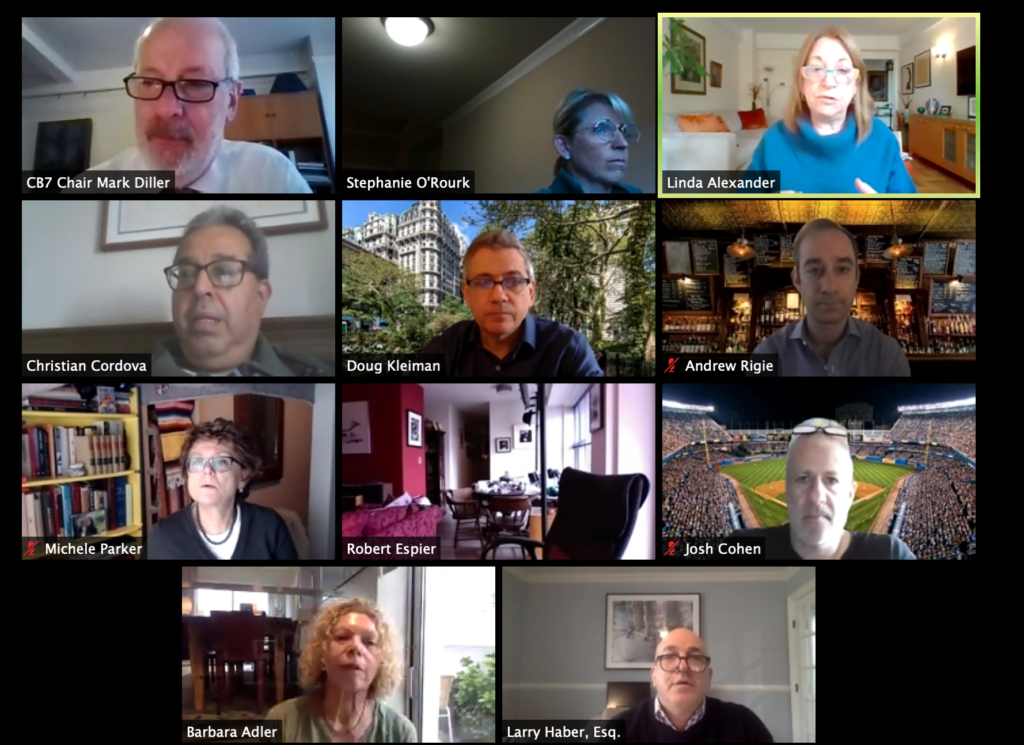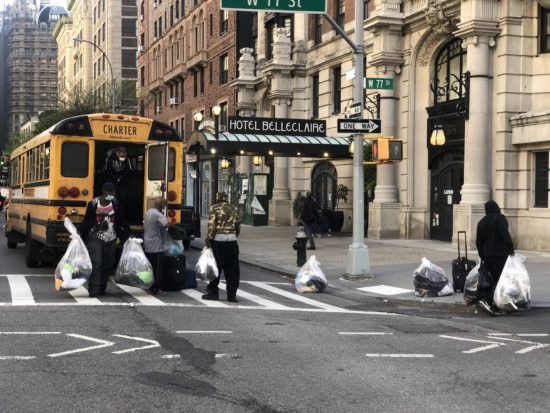By Alex Israel
Industry leaders are working hard to determine how Upper West Side restaurants and small businesses might be able to survive the fallout from the coronavirus. But uncertainty about the future is making it difficult to plan too far ahead.
Since March 22, restaurants and bars in New York City have been restricted from providing service beyond delivery and takeout. Other businesses deemed ‘non-essential’, like salons and gyms, were ordered to close indefinitely. While Governor Andrew Cuomo has stated that he will allow some “low-risk” businesses to reopen after May 15, businesses in the city will likely not be included.
During a webinar hosted by the Business and Consumer Issues Committee (BCI) of Community Board 7 (CB7) this week, several figures with expertise in the hospitality, real estate, and retail industries came together to discuss the future of small businesses. One clear takeaway: Landlords and tenants will need to work together to get through this.
“The landlord and tenant relationship has always been symbiotic,” said director at RIPCO Real Estate and CB7 second vice-chair Doug Kleiman, who has represented retail tenants and landlords in the community for more than two decades. Kleiman said many of his landlord clients were “being thoughtful and reasonable” at this time, but noted the volatility of the market even before pandemic struck. “A lot of businesses were already at the edge of failure. And this will push them over the edge.”
Larry Haber, the managing partner of the commercial real estate department of the law firm Abrams Garfinkel Margolis Bergson, LLP, believes opening a line of communication is the key to success between landlords and tenants. “I’m imploring both sides to not ignore one another,” he said, adding that many landlords on the Upper West Side are “mom and pops” who “have their own tale of woe.”
The panel’s call for collaboration wasn’t limited to landlords and tenants. They also discussed the need for quick action on policy at the federal, state, and city levels. “We need the government to be a collaborative partner,” said Haber.

Stephanie O’Rourk, a CPA and partner leading the hospitality industry practice at CohnReznick, agreed, describing the dilemma many of her clients across are facing due to the current restrictions within the federal government’s Paycheck Protection Program (PPP), which offers loans to small businesses.
Part of the PPP’s mandate is that at least 75 percent of the funds must be used for payroll—which is a major issue when businesses are not able (or allowed) to fully open, or when owners aren’t able to draw back employees who are content making more money on unemployment, O’Rourk said. “Until the government provides better guidelines” regarding these relief programs, “[the funds] will be hard to spend,” she said, adding that for many operators, specifically smaller ones, Small Business Interruption Loans provided for under the CARES Act might provide a more manageable and flexible solution.
“We have an unprecedented situation at hand, and we need to have big, bold policies to help support our city as a whole,” said CB7 first vice-chair Andrew Rigie, who is the executive director of the New York City Hospitality Alliance, the chair of NYC’s Office of Nightlife Advisory Board, and a recently appointed member of Governor Andrew Cuomo’s New York Forward Re-Opening Advisory Board.
At the city level, Rigie highlighted three policy proposals that would help support bars, restaurants, and other small businesses across the city.
One such policy involves capping third party delivery fees at 10 percent. While platforms like Seamless help to increase restaurants’ exposure, Rigie said, their charges can cut deeply into restaurant profit margins.
Another suggests waiving sidewalk café licensing fees, which Rigie said would help ease the financial burden for restaurants currently unable to operate with their existing licenses, and encourage new restaurants to utilize outside space once it is safe to reopen.
The last would suspend the personal liability provision in leases for the duration of pandemic-related matters, ensuring that business owners won’t have to sacrifice their own personal assets while being forced to shut down by the state, Rigie said.
But even with these policies enacted, the big question remains: when the government deems it safe, are people going to want to patronize bars, restaurants, and other small businesses again with the same vigor as before?
Rigie thinks so. While he listed some safety strategies business owners are considering—including implementing contactless and cash-free payment, disposable menus, and plexiglass dividers—he didn’t have any singular prediction for the future.
“It’s a little premature to tell,” he said, noting that the restrictions and requirements set forth by the governor will ultimately determine how and when businesses can operate.
“It’s going to be tough,” he added. “But at some point when it’s safe, people are going to crave being back together… and when we are back together, we will be in our restaurants and bars.”









This is all well-intentioned but opening a “line of communication” between landlords and tenants is a bit like opening up a line of communication between passengers on the Titanic.
Both tenants and landlords are drowning in this pandemic and they both need outside assistance.
Yes, landlords might be able to reduce the rent they charge a bit but they have their own expenses. As this article correctly states many landlords are small family owned businesses but even big landlords are being slammed now (take a look at Related and their Hudson Yards Mall tenants).
Many of these small businesses were barely staying alive even before the pandemic. I would assume the few restaurants open for takeout/delivery are operating at a loss and this is simply a reduction of the even bigger loss they would have if they closed their operations entirely.
The city could step in, however. They can offer landlords an abatement or at least a deferral of property taxes if the landlord agrees to pass on these savings as a reduction to their tenants’ rents. The city could also abate or defer the commercial rent tax.
Furthermore, the city/state should abate/defer the sales tax that restaurants charge. This would reduce restaurant bills and might be a bit of an incentive for people to order in more.
Nobody has an interest in seeing even more boarded up storefronts and bankruptcies. The city needs to step in.
DaCapo Columbus $20 2 tacos & margarita tomorrow for Cinco de Mayo.
May 13 Cousins Lobster Truck 275 Amsterdam. Have to register on app.
One thing we could do during the summer, at least on weekends is turn the avenues into open air cafes. This would permit sitdown dining outside in a socially distant manner, helping restaurants, bars and cafes and allowing UWS to be outside in a socially distant manner and enjoy some semblance of normality.
Not a very well thought out idea. You can’t just close avenues in some arbitrarily selected locations that favor certain restaurants over others. And you can’t close all avenues. What about the restaurants on side streets? Non-restaurant businesses are not going to sit by while major transportation routes they depend on are disrupted for the benefit of the restaurants.
You can close as many avenues as possible, consistent with the needs to retain access for emergency vehicles.
While this will not necessarily help all restaurants, it will help a significant fraction.
And, it is unclear that this hurts other businesses; having more people out for leisure may well increase shopping at stores on the same street.
“You can close as many avenues as possible, consistent with the needs to retain access for emergency vehicles.”
Not possible to do without major disruptions. Imagine having street fairs on Broadway, Amsterdam, & Columbus on the same day. Not closing one of them would put some restaurants at a disadvantage. That’s just the UWS. How would you manage such a program citywide? Are you prepared to pay for an inordinate amount of manpower needed to place barricades and police to enforce the closures? It would be like a citywide street fair. It’s an unattainable and far-fetched solution.
Also, let me know how successful you are in convincing all the complainers who can’t handle the perceived traffic congestion a single bike lane has had on those avenues you would like to close.
“While this will not necessarily help all restaurants, it will help a significant fraction.”
What do you consider a significant fraction and what has your analysis told you would happen specifically on the UWS?
Convert bike lanes to pedestrian walkways and put tables on sidewalks. Make money and create jobs for restaurants. The neighborhood needs these businesses back!
Sherman, I like what your saying. I think that it’s not just the city that needs to step in but the Federal government needs to as well. Lots of people may complain that these were failing businesses anyway but for the moment until a vaccine is readily available bigger ideas need to be implemented. Fixed costs need to be considered. Yes landlord need to reduce rents and tax abatements and credits should help. Social distancing for the benefit of everyone needs to be maintained so that means that business revenue and workers pay will suffer. Maybe instead of the PPP once we start to return to the new “normal” that the Fed can provide a bridge to make employees pay whole. Maybe Federal Bonds can be floated to help pay for these types of support over a 10 year period. What I know is that it’s Big ideas and implementing them quickly over a 30/60/90 day period is what’s needed instead of flying to a Honeywell factory making masks in Arizona for a photo op and an attemp at securing votes.
Some are going to say say lots of “liberal” thinking again but right now we need the government to step in and not just support giant business’s at the exclusion of so many others.
Lastly I want to thank Boris for being so generally a malcontent and looking at the negative side of so many comments. It’s been amusing to see your comments and the predictability of what your going to say – so thank you. I also don’t think being a Polly Anna is the right perspective either but it would be refreshing to see solutions instead of the usual complaints. Just constructive criticism.
Yes, the Federal government is the answer to all of our problems.
I rejoice at being a malcontent and predictable when it comes to eviscerating the multitude of wacky ‘solutions’ being offered. It’s evident that many posters have never invested a dime in anything, managed a business, or dealt directly with governmental entities. I’ve done all successfully so I speak from experience knowing the limitations of ridiculous proposals. Pollyanna-type behavior is a great way to describe what you refer to as solutions. Unfortunately, many of these solutions are a result of high school level idealism that can’t be implemented in a large metropolis like NY. I don’t claim to have the answers but I know what doesn’t work.
Boris –
Insulting people whose experience you’ve no idea about is a brilliant counter argument. Well done.
People are welcome to defend their positions with reasoned and thoughtful analysis based on their real world experiences if they feel insulted. In the absence of that, I’m comfortable making assumptions about what type of background some people have based on their suggested solutions.
Who gets insulted if a stranger critiques their post and explains why? Imagine this is an ongoing community hearing and when it’s my turn to speak, I debunk another speaker’s points. That would be perfectly acceptable and expected.
Prior experience may be an anachronism in these times. New and different ideas which may not have worked in the past are what is needed now. Creativity, ingenuity and a positive rather than a negative perspective.
Hats off to those businesses who seem to be adapting so well. We are supporting your endeavors.
Boris, your right, I have no idea what your experience is but what I do know is mine, least of which do I feel the need to list unlike you have. We all know that the company you share is a pretty big group. You many not have all the answers but I truly believe that you know everything that doesn’t work and that’s why most truly successful people no matter what they do realize that’s it’s not only their ideas that are the best (like some) but that true success comes with the support of others.
I may not agree with all of CLL perspectives and suggestions, that’s pretty normal, but what I do agree with is that fresh, new ideas are needed now just as FDR did after the Depression and what Truman did in Resurrecting Europe after WWII.
Lastly I apologize if I insulted you. You used that word 3 times in 3 different posts, one right after the other. My only interest is to voice my opinion and observations but feel free to disagree – we still, at least for the moment, live in a somewhat free country.
How about the banks suspending or modifying their interest on mortgage loans to small landlords? Just a thought.
First the PPP loans are of no much help in its current form. How are we go to spent 75% in payroll when we are still closed in 8 weeks? And is not realistic as percentage when payroll is about 25% of the business sales. And operating at half capacity or waiting for consumer confidence to return, which may take up to one year, we may not be able to rehire all prior staff. This is a major impediment for this loan to be usable and it needs to change ASAP. This is a priority.
Secondly the rent moratorium helps but in the end is a must it goes much further. Who will have months of back rent to pay? We need 3 to 6 month rent forgiveness and a law requiring landlords to renegotiate leases. The real estate market won’t be the same and if we’ll operate at reduce capacity how can we pay full rent? This can be done by a combinations of measures, such as tax credits for landlords and stiff penalties for empty stores.
Third and also most important we need NYC to allow service charges for the FOH staff as other NY counties do. This will help tremendously with the payroll.
In absence of these drastic measurements many stores, restaurants and others, will close, the city and state will loose the little revenue an open business would have generated, there’ll be many store fronts closed and unemployment will still be high, with the state having to fit in the bill.